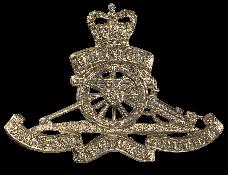
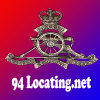
Joining up.
I had always wanted to join the RAF, one day. I tried to join as a boy entrant (apprentice) at 16, but I was not accepted. Not really settling into a job, I decided tojoin up and went into London to do so. There I was told that the RAF intake took place very September (it was May), so with all the cockiness of my seventeen years I replied "Take me now or I will join the Army". That was why, a week later, I found myself sitting naked on a chair with a dozen or so other lads (in a building in Whitehall), awaiting the MO.
The orderly had thoughtfully handed out magazines of a type most favoured by the armed forces. The MO turned out to be female and very accurate with her ruler, which eliminated the effect of the magazines rather quickly. I dont know if the Doctor knew what the orderly was up to, but that was my first taste of forces humour.
I had signed up for the Guards. Sitting beside me in that corridor was a chap ( Alan Boniface), who was signing up for a second time. His advice was "Why walk when you can ride ? Join the Royal Artillery". So I did, and walked rather a lot.
Two weeks after the medical I was on a train heading for 17 Training Regiment RA, at Oswestry, Shropshire. I had a few reasons for joining the Army ( if not the RAF). My perception of the Army was that it would be full of thugs and tough guys who would make me like them ( which I dearly wanted to be), and I was more than a bit nervous as the train headed north, from London.
17 Training Regiment RA.
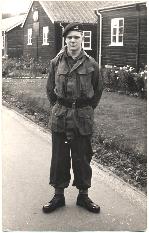

Once I reached Oswestry I discovered a whole group of people my age, each of which was about as scared as I was. Some of them I could not understand nor them me I encountered my first Geordie,Scouser,Taff,Jock and Brummie, and many more regional dialects. There were a few tough guys and maybe a thug or two, but in general the first shock was that we were all pretty much the same. Over two or three weeks we did nothing. We got clothed and fed and paid,and slowly our numbers increased, until the day the barracks (F Troop) was full. Then we started.
There was the inevitable testing, both physical and academic. Physically I was not wonderful, but I was pleased not to be the worse recruit either my first 100 yards time was around 15sec as I recall, and I could climb a rope to the top well enough. I was exempt Army education I was deemed already bright enough ( I could read, add up and write my name).
I spent six months training at Oswestry and my 100 yards came down to around 10 seconds, and I never was the worse recruit. Training was tough but fair, without a doubt it was fair, and I was the fittest I have ever been in my life. We all gave up smoking on day one on the advice of the instructors - and I think we nearly all started again the day we left Oswestry.
This is a view of some of the barrack huts. In actual fact they were quite comfortable and spotlessly clean - we saw to that. At the far back is the edge of the assault course. One obstacle was a pit over which was a board held by a chain in each corner. In the bottom of the pit were various rocks and broken bottles - I am sure the bottles were not intended to be there. To cross the pit involved one foot on the swaying board and launch yourself off. I never saw anybody miss the board.
Tough was completing a 15 mile run only to have the PTI ( Physical Training Instructor) take us out again just to keep us fresh.
It was a day on the Rifle Range (about 20 miles from camp), and finding that the trucks had not returned. So we ran back to camp and F Troop still won the Regimental Sports Day, the following day.
It was alsothe PT test, a 10 mile march, carrying a buddy (and his kit) over the assault course and then scoring a minimum score with the rifle (they were 7.62mm SLRs, similar to the Belgian FN) and all this in under 2 hours.
And there was fair. Thugs and bullies had no chance at all. I remember the few that we had being rooted out in the first week or two. They ended up in the gym learning unarmed combat from a PTI, the painful way.
Fair was working at midnight for an inspection only to have the NCO in charge of us (Bombardier Ingellis), come in with fish and chips for everybody, and which he paid for.
There was also the fairness of being offered one on one in the ring for anybody who felt they were being picked on. It was after a pair of would be tough guy Aussie bothers got a sound hiding that we found out our Bombardier Ingellis was also a regimental boxer.
So we ran around most of Wales, night and day. We spent hours on the square, marching up and down. Learning to abseil was fun we stood on a high rock in the Brecon Beacons with the PTI tossing stones at us until we found the courage to jump, which we all did in the end, then racing back up for another go. We learned to look after ourselves, and most of us learned to grow up. A few left it was an open option at the start, but generally, we all got through it, together. I was still hopeless at sport, but I was as fit as the rest. The Regiments we were to go to were posted, we had our passing out parade, and then it was two weeks leave before, in my case, Germany.
For most of us it was our first time flying (although I had flown trainer aircraft in the Air Cadets), and it was also our first time abroad. We flew from RAF Lyneham in Wiltshire to Hannover, and from there by coach to Celle which is about 50 miles East. We were only allowed to bring what we could fit in our kitbags, and that must include all our issued kit so not much room left. For that reason most of us had two or three layers of clothing since we all chose to wear as many civilian clothes as we could, underneath our uniforms. It was hot in that aircraft!
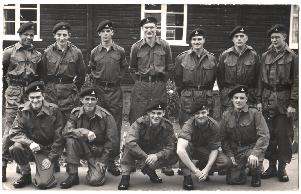
This is F Troop. I am at the back right - behind that calm facade lurks a trained killer.
Alan Boniface is rear rank, second from the left. To the left of Alan is 'Bongo' Gordon who was a great guy and became a Sergeant in the Regiment that I joined, and to the right, the mild looking chap is 'Harry' Harris who went on to be attached to the SAS, dropping out of aeroplanes all over the place, and who now lives in Tuscon Arizona. I once drove through without even knowing he lived there.
94 Locating Regt RA Germany
The final ceremony at Oswestry was the destruction of the boots we had so lovingly bulled to a mirror gloss over the past six months. Immaculate webbing was trampled, gleaming brasses left to tarnish. 'Bull', we were told, was over. When we arrived at 94 Regiment in Celle we were deemed raw recruits, not yet good enough for The Regiment, and put into training. Another six weeks of polishing boots and drill and physical training. Ah, that Army humour. Even our beds were not the usual (very comfortable) Dunlop foam, but Horsehair stuffed lumpy mattress covers. After the six weeks we were assigned jobs and bed spaces (as the Army termed it), with the main Regiment and soft mattresses.
I was to be a Radar Operator in Robert Troop, part of 57 Bhurtpore Battery. 94 was an Artillery Regiment, but special we had no guns. The job of 94 was target acquisition and Metrology. The Radar I learned to operate was housed in Saracen armoured cars which were we soon discovered, very easy to drive, License or no. The driver sits in the middle and the gearbox is pre-select, so the trick is to be able to anticipate the next gear you expect to use, then slam down the pre-select pedal and its done - no clutch to worry about. Despite the weight of the Radar, those Saracens could really move.
Trades in the Army have grades that directly affect pay. For Radar Op the grades ran B3 to B1, and it was normal for B3 to be a Gunner (Private), B2 a Bombardier (Corporal) and B3 a Sergeant. As ever, I had to be different. I easily reached B1, but I was still a Gunner. Unfortunately, I was never much of a soldier, just a techie at heart.
Germany could be a ramble all on its own. Celle is about 30 miles from Bergen-Belsen and it was said that the barracks were used in the war as a base for troops that ran that place; there were many such stories. I did visit Belsen. To stand by a mound where a sign says here lie 10,000 is difficult to convey in words. A Drone ( radio controlled aircraft) went down one night over Belsen and the recovery team refused to go in until dawn. The one occasion I saw a direct order refused without punishment.
Ever the bad sportsman, I finally found a sport
I could do and enjoy. We were sent to Alteneau in the Hartz
Mountains to be taught ski-ing,
 prior to some winter warfare training in Bavaria.
I loved it. Another achievement in 94 for me was swimming.
They tried during training, but it was no go, I just could not swim.
Later, The Regiment went to Libya for Desert Training. My Troop was
dubbed enemy and we were to wear civvies and harass the regiment
as they played soldiers. We found a sheltered bay on the coast and set
up camp, raiding the main Regiment at night, and in the day (when we
did nothing but laze around) I finally learned to swim. I got to visit
Benghazi and Tobruk, and being 1967, it was little changed from
the end of the war.
prior to some winter warfare training in Bavaria.
I loved it. Another achievement in 94 for me was swimming.
They tried during training, but it was no go, I just could not swim.
Later, The Regiment went to Libya for Desert Training. My Troop was
dubbed enemy and we were to wear civvies and harass the regiment
as they played soldiers. We found a sheltered bay on the coast and set
up camp, raiding the main Regiment at night, and in the day (when we
did nothing but laze around) I finally learned to swim. I got to visit
Benghazi and Tobruk, and being 1967, it was little changed from
the end of the war.
I had never got on with one of the Sergeants, Jock Owens. One day we were firing Rockets and tossing grenades into a Wadi. He passed one which I threw, but it did not go off. Ordered to go and find it, I refused until he agreed to come with me. He found the grenade and threw it to me, and I caught it. The trigger lever had been held down with sellotape. Where do you find sellotape in the middle of the Libyan Desert ? Well he did. Ah, that Army humour again. Laugh, we almost died.
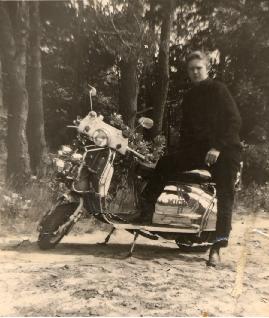
Before I leave Germany, I must mention my scooter
travels. As a Mod on civvy street I had the required chrome
Lambretta, parka etc. I took my scooter to Oswestry which proved
very useful for getting around, and then I rode it over from High
Wycombe to Celle.
It was quite a novelty as the locals had never seen a real Brit Mod scooter up close before. One winter weekend I rode it home, went on a date, (it was a Nurse from Harlow, Essex) and then back in time for parade on Monday morning mad.
I aquired my first car whilst in Germany ( bought on leave in the UK and then driven over). With that new freedom four of us Londoners would get out of the immediate area and found towns that were not frequented by 'squaddies'. This way we made a lot of German friends. I slept under a Duvet for the first time at a German friend's house - what, no blankets?
8th Surveillance Troop RA
Gibraltar
When Spain closed the border with Gibraltar in 1969,
the might of the British Army was sent to defend our brave colony
that was us, renamed 8 Surveillance Troop and shipped out to
Gib ( not The Regiment, just Robert Troop, all 24 of us). I was
not selected for the first run which was with the Saracens, by sea,
but joined them about six months later.
 We were housed with the RAF at RAF North Front.
In the picture on the left, the RAF Camp is the group of white
buildings at the back - yes we all had a sea view. We only worked
at night and had a lot of free time and I drifted into the Broadcasting
studio that served all the bases and quarters on The Rock. When
the duty announcer failed to turn up one night I was coerced behind
the microphone, and a legend was born. I think that is right because
the Sargeant Major often used to shout "Oughton, you orrible little
leg end, get over 'ere at the double!". At this time Johnny Walker
was on Radio Gib, Anne Nightingale on GIBTV, and the first episodes
of Star Trek ( in Black and White) kept us in every Wednesday night.
We were housed with the RAF at RAF North Front.
In the picture on the left, the RAF Camp is the group of white
buildings at the back - yes we all had a sea view. We only worked
at night and had a lot of free time and I drifted into the Broadcasting
studio that served all the bases and quarters on The Rock. When
the duty announcer failed to turn up one night I was coerced behind
the microphone, and a legend was born. I think that is right because
the Sargeant Major often used to shout "Oughton, you orrible little
leg end, get over 'ere at the double!". At this time Johnny Walker
was on Radio Gib, Anne Nightingale on GIBTV, and the first episodes
of Star Trek ( in Black and White) kept us in every Wednesday night.
 We were housed with the RAF at RAF North Front.
In the picture on the left, the RAF Camp is the group of white
buildings at the back - yes we all had a sea view. We only worked
at night and had a lot of free time and I drifted into the Broadcasting
studio that served all the bases and quarters on The Rock. When
the duty announcer failed to turn up one night I was coerced behind
the microphone, and a legend was born. I think that is right because
the Sargeant Major often used to shout "Oughton, you orrible little
leg end, get over 'ere at the double!". At this time Johnny Walker
was on Radio Gib, Anne Nightingale on GIBTV, and the first episodes
of Star Trek ( in Black and White) kept us in every Wednesday night.
We were housed with the RAF at RAF North Front.
In the picture on the left, the RAF Camp is the group of white
buildings at the back - yes we all had a sea view. We only worked
at night and had a lot of free time and I drifted into the Broadcasting
studio that served all the bases and quarters on The Rock. When
the duty announcer failed to turn up one night I was coerced behind
the microphone, and a legend was born. I think that is right because
the Sargeant Major often used to shout "Oughton, you orrible little
leg end, get over 'ere at the double!". At this time Johnny Walker
was on Radio Gib, Anne Nightingale on GIBTV, and the first episodes
of Star Trek ( in Black and White) kept us in every Wednesday night.
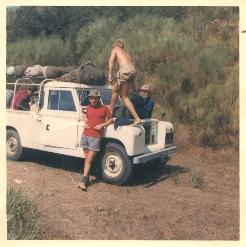
Learning to drive took place in
Morocco.
We all set off for what was called, Adventure Training.
This involved loading up two Land Rovers with tents and setting
off on the ferry to Tangier for two weeks boozing around Morocco.
We toured around, taking turns to drive, to the Atlas Mountains,
Agadir, Rabat, Marrakech, Cassablanca and to the edge of the Sahara
itself.
Back in Gibraltar I took a driving test (knocking down a Gibbo along the way well I only whacked him with the wing mirror but he still went down), but I still passed and got my pink slip my civilian license. As the only motorcycle rider I also got to bomb around the Rock an old Army despatch motor bike we discovered. We painted the helmet white and everybody thought I was an MP.
That the Spanish never invaded is testament to those fearless 24 who defended our far flung Colony and which remains British to this day. We never got a medal nor asked for one, we just served ( and it sure made up for Oswestry). We also got very brown and I found another sport to enjoy snorkelling. I finally left the Army from Gibraltar, being shipped back to the UK and discharged at Southampton. On my first day as a civilian I drove home to High Wycombe. By then I had my first car, a Wolsely 15/60. As I drove through Caversham in Reading, it was March 1970, I was booked for speeding. Until then my Army ID card had got me out of any problem, but not anymore. Welcome to civy street.
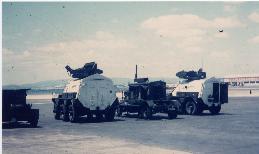
These are the Robert 9 Mk1 Radars, We painted them white to keep out the heat.One night some bright spark in the RAF crept by and painted big red crosses on them.
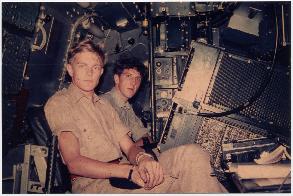
This was taken during a night shift on the end of the runway. We discovered that we could train the radar on the guardroom and thus keep watch for the orderly officer on his rounds. Sometimes we looked towards Spain, and we caught a lot of smugglers. Once a month or so the Customs would give us a 'share' of the booty - usually some cigarettes and a bottle or two....

So I had finally learned to swim. Usually we would toss in our spear guns -loaded, then fall back into the water. This was fine until the time I fell back onto my own gun.
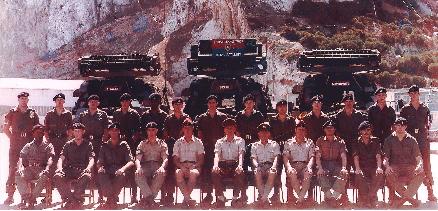
(Above) The granite in the background is the Rock of Gibraltar. It was an alternative view, ( to the sea) from our barracks windows. The runway runs across the main road that links Gib to Spain (built on reclaimed land). We were based in a hangar at the edge of the runway, which is located justin front of where this picture was taken from.
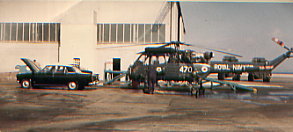 And finally, where else but The Army. The RAF staff car is at the 'car
wash'. Queing for his turn is the helicopoter. You can just see the Saracens
parked by our hangar, behind the helicopter's tail. So that'll be the special
premium wash, buff the blades and polish the gun barrels eh squire ? Oh
and aviation is up again this week to 3/6d, but you get double stamps or
a free glass with every 100 gallons.
And finally, where else but The Army. The RAF staff car is at the 'car
wash'. Queing for his turn is the helicopoter. You can just see the Saracens
parked by our hangar, behind the helicopter's tail. So that'll be the special
premium wash, buff the blades and polish the gun barrels eh squire ? Oh
and aviation is up again this week to 3/6d, but you get double stamps or
a free glass with every 100 gallons.
